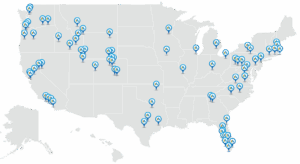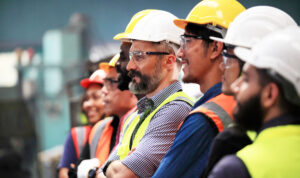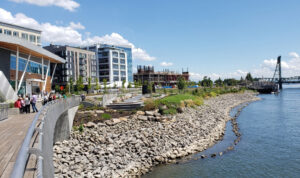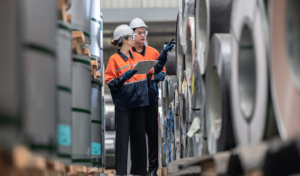Apex Program Manager Prem Neupane Featured in Land Science Article
 As an experienced Program Manager with Apex Companies, LLC, a leading environmental services firm and valued Land Science® client, Prem Neupane has an ongoing appreciation for seeing firsthand how his efforts and those of Apex can make a difference in site cleanup. “When I compare the before and after activities at the remediation site,” he says, “Especially those in the State Voluntary Cleanup Program, Brownfield program and sites located in urban areas, our project work continues to provide me with great satisfaction.” With 18 years of experience at Apex, first as an Environmental Scientist, then as a Project Manager and now as a Program Manager, Neupane has been involved in a diverse range of remediation projects. In his current role, he manages several clients, participates in business development, and manages all aspects of his project work- from initiation to close-out. He shares, “I like interacting with clients, our trusted vendors and suppliers/lab, and fellow Apexians, and ultimately finding the optimum solutions for environmental remediation problems.” Prior to joining Apex, Neupane performed a year-long internship with the USGS in Dover, DE working on the Air Force Base projects. To prepare for a career in environmental science he earned a BS in Environmental Science from Troy University, followed by an MS in Science and Water Resources at Miami University in Ohio. He continues, “I became interested in the environmental field during high school. After completing my undergrad studies at Troy University, I went straight to graduate school to further enhance my knowledge of environmental issues. While working on my Master of Science at Miami University, I was able to take a few advanced level courses in contamination and shifted my focus toward environmental characterization and remediation. Aside from seeing projects through to fruition, it’s the interdisciplinary nature of this field that interests me the most.”
As an experienced Program Manager with Apex Companies, LLC, a leading environmental services firm and valued Land Science® client, Prem Neupane has an ongoing appreciation for seeing firsthand how his efforts and those of Apex can make a difference in site cleanup. “When I compare the before and after activities at the remediation site,” he says, “Especially those in the State Voluntary Cleanup Program, Brownfield program and sites located in urban areas, our project work continues to provide me with great satisfaction.” With 18 years of experience at Apex, first as an Environmental Scientist, then as a Project Manager and now as a Program Manager, Neupane has been involved in a diverse range of remediation projects. In his current role, he manages several clients, participates in business development, and manages all aspects of his project work- from initiation to close-out. He shares, “I like interacting with clients, our trusted vendors and suppliers/lab, and fellow Apexians, and ultimately finding the optimum solutions for environmental remediation problems.” Prior to joining Apex, Neupane performed a year-long internship with the USGS in Dover, DE working on the Air Force Base projects. To prepare for a career in environmental science he earned a BS in Environmental Science from Troy University, followed by an MS in Science and Water Resources at Miami University in Ohio. He continues, “I became interested in the environmental field during high school. After completing my undergrad studies at Troy University, I went straight to graduate school to further enhance my knowledge of environmental issues. While working on my Master of Science at Miami University, I was able to take a few advanced level courses in contamination and shifted my focus toward environmental characterization and remediation. Aside from seeing projects through to fruition, it’s the interdisciplinary nature of this field that interests me the most.”
With nearly 20 years of experience in the environmental industry, Neupane takes great pride in his work, while continuing to focus on the company’s long-term goals, which include the practice of utilizing sustainable remediation technologies. He continues, “At Apex, we plan to strategically grow the company by harnessing the power of innovation, especially in the use of green remediation. We continually invest in leading-edge, sustainable remediation technologies and in remediation experts who can develop and deploy them. Beyond our use of evaporative desorption technology (EDT), ex-situ on-site bioremediation, cryogenic vapor treatment technology (CVTT), and remote station soil vapor extraction (SVE)—which are just a few ways we help our clients move to more effective results—we plan to adopt and deliver more efficient, practical, and sensible remedial strategies that continue to benefit our clients and communities.” When it comes to working with Land Science®, he continues to be impressed with their client service, responsiveness, and their ability to assist with product recommendations that fit a variety of challenges and situations. He points out that on a recent project, and on short notice, Land Science® met the Apex team at the job site to discuss solutions for an existing issue. As for which Land Science® products Apex uses, two come to mind. He shares, “Geo-Seal® and Retro-Coat™ vapor intrusion coating are those we have used the most. However, we are open to the new products Land Science® has rolled out recently. Geo-Seal® is a composite vapor intrusion barrier system that consists of chemical resistance high-density polyethylene (HDPE) and spray applied asphalt latex. It is ideal for installation on new construction. Retro-Coat™ consists of a chemically resistant material that is applied to existing structures to prevent potential vapor intrusion risks. I like them both because they are relatively easy to apply, are compatible and effective with VOCs from petroleum as well as chlorinated solvents sources, and they are very popular and well liked by regulators.”
When asked about the future of environmental remediation, including trends on the horizon, Neupane points to advancements in technology that enable more accurate targeting of contamination in subsurface and faster analysis. He also expects to see more cost-effective solutions, greener cleanups, and green remediation to minimize the environmental “footprint” of remediation activities, emerging contaminants, and vapor intrusion solutions. He notes that the EPA describes green remediation as “The practice of considering all environmental effects of remedy implementation and incorporating options to maximize net environmental benefit of cleanup actions.” He continues, “Some local and state regulatory agencies, such as the Department of Energy & Environment (DOEE) in Washington, DC, are encouraging responsible parties to consider and report green remediation strategies for remediation sites. Green remediation allows us to reduce the environmental footprint of a cleanup project.” To stay abreast of emerging technologies and trends, Neupane regularly attends seminars and training modules and participates in webinars offered by remediation industries and coalitions, such as those offered by the Interstate Technology & Regulatory Council (ITRC). He shares a recent example of a training seminar he attended in May of last year, “I attended Vapor Intrusion (VI) & Soil Gas Training provided by Dr. Blayne Hartman of Hartman Environmental Geoscience, at Argonne National Laboratory in Chicago. The training was very informational and covered the latest in regulatory, assessment, sampling, analysis and mitigation, as well as legal considerations.” When prompted about the most challenging aspect of his work, he feels accounting for project uncertainties and including contingencies to complete the remediation work on budget and on time can be difficult. “Weather can also be a challenge sometimes,” he says, “Especially with large scale water-related projects during winter months.”
Currently residing in Chicago, with his wife and daughter, Neupane works out of Apex’s downtown Chicago office, and frequently travels to the company’s Washington, DC region for project work and meetings. In his free time, he enjoys hiking, biking, and visiting new places with his family. He shares, “Having grown up in Nepal, I was always drawn to the beauty of the Himalayas. I visit Nepal and try to hit the hiking trails there whenever possible. I was in Nepal just this past October with the family and did some hiking near Mt. Annapurna (10th tallest mountain). Whenever I travel to a new place I seek out nearby hiking/biking trails.” And how would he encourage others to join his field of study? He concludes by emphasizing the potential long-term contributions that his profession makes possible. “Remind those who may be interested that they can make a positive impact on human health and the environment. Look at the bigger picture and think of your contribution to future generations.”
Land Science® is proud to have Prem Neupane, Project Manager for Apex Companies, LLC, as a valued client and partner in environmental remediation, and appreciates his expert knowledge and experience in providing successful remediation outcomes for Land Science® and its clients.
This article was sourced by Land Science.
Apex Associated Press (Apex AP) represents contributions from various authors within the Apex professional community.
